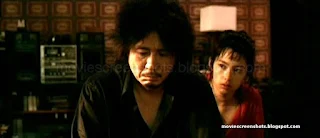Director: James Mangold
Saturday, 18 November 2023
What is a MacGuffin?
Director: James Mangold
Thursday, 10 August 2023
The superpower within...
We longed secretly to have that single superpower, not to change the world, but to be better than the most intelligent guy in class; or the tallest, the strongest, the funniest, pick your pick.
In the annals of time, somehow, we lost interest in all this sorcery. The journey of life straddled us thus far. We look back at our lives and are happy with what we see. We cannot fathom how the heck we managed to achieve all of these. Given a chance to do it all again, we are sure we would not have made it. The hard knocks that life had to offer pushed us to achieve the impossible. Perhaps they awoke the sleeping superbeing within us to fight our inner demons to come out tops. Sometimes we marvel at our achievements and ask ourselves how we did all the things we did - that public exams, that marathon, that earth-defying feat. We doubt we could reproduce such results if we were to do them all over again.
In other words, we have powers within us waiting to be harnessed. We need not go around looking high and low for that push. No beam of light will shine from above to give it extraordinary powers. Still, all have us have that feared Kryptonite that may ruin us. Stay away!
In a convoluted way, this is the subtle message this film is trying to impart. Three characters with superpowers within their own rights - David Dunn (Overseer), Kevin Crumb (with multiple identities, including the Beast) and Elijah Price (Mr Glass).
The Overseer, the unassuming middle-aged man with incredible strength, with the help of with adult son, manages to capture the Beast, who is high on alert for kidnapping four teenage girls. But both Overseer and Crumb are captured and held in a high-security infirmary. Within the facility, the apparently catatonic Glass is also kept. The doctor in charge of them is part of a secret organisation out on a crusade to tell the world that there are no superheroes but disillusioned individuals with delusions of grandeur. In their defence come Glass' mother, Dunn's son and Casey Cooke, the victim who escaped Beast's clutches in the second offering of this trilogy, Split (2017).
Glass plans an elaborate escape route to announce to the world that they indeed have superpowers.
Tuesday, 18 October 2022
Hypnotised to conform?
Director: Park Chan-wook
It looks like we are walking around like hypnotised beings, doing what is taught to us. We were coached to hold specific values close to our hearts because that seems the only correct way to live our lives. Again and again, we are drilled with these ideas to give a sacrosanct feel to it. In a way, we are all zombies walking around doing things expected of us. The funny thing is that nobody knows what is expected from our existence. We are told that, unlike other creations, humans are given that unique sense called consciousness that puts us apart from animals. Hence, there is a need to follow specific rules.
Thursday, 14 October 2021
Not the love of one's life but love of life itself!
Before Sunrise (1995)
Before Sunset (2004)
Before Midnight (2013)
This must surely be a very ambitious project. In a way, it is real-life experimentation. It tells about how life treats two individuals over a span of 18 years. It shows how two 23-year-olds look all doe-eyed at life and again at 32 and 41. At each time, we get an idea of how they see life is ahead. They embrace it with so much zest, thinking that they know why their elders get it all wrong. They thought they had discovered the secret why so many from the generation before were so miserable and vowed never to repeat their mistakes. They could see as plain as day what and where they went wrong. They knew they would never prey to these situational demands.
Thursday, 21 January 2021
In the mood?
In the Mood for Love (Cantonese; 2000)
Director: Wong Kar-wai
 This film must surely be a fruit of a labour of love. It is such a joyful experience to watch as the viewers are cradled back to a Shanghainese community's claustrophobic surroundings in 1962 Hong Kong.
This film must surely be a fruit of a labour of love. It is such a joyful experience to watch as the viewers are cradled back to a Shanghainese community's claustrophobic surroundings in 1962 Hong Kong.It is a story of a close-knit group tenant, specifically of two couples, in an apartment building. Two spouses who are often left alone by their busy working partners end up developing feelings for each other. The busy partners in real fact are embroiled in an affair, between themselves. The scorned spouses discover a common interest, create a platonic relationship but soon realise it is romantic. They resist the temptations to be as low as their partners, despite the circumstances of time and the lure of their biological attractions.
-
Razakar: The Silent Genocide Of Hyderabad (Telegu, 2024) Director: Yata Satyanarayana In her last major speech before her disposition, Sh...
-
Now you see all the children of Gemini Ganesan (of four wives, at least) posing gleefully for the camera after coming from different corners...
-
In the Malay lingo, the phrase 'ajak-ajak ayam' refers to an insincere invitation. Of course, many of us invite for courtesy's ...



















